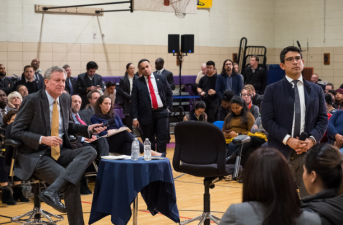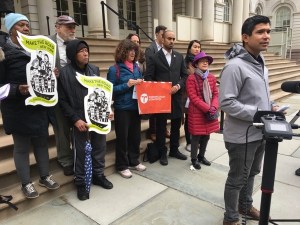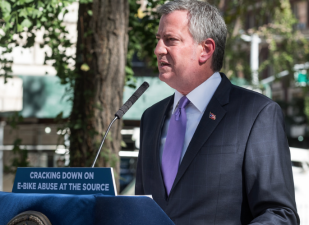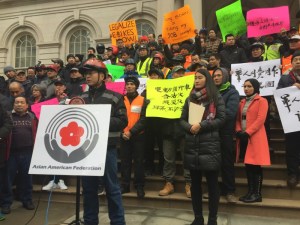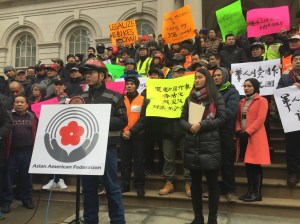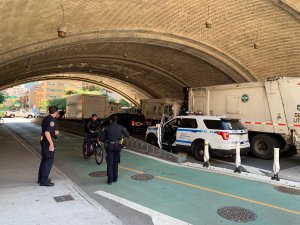Delivery Workers Confront de Blasio Over E-Bike Crackdown
The mayor said he's willing to explore legalization of e-bikes in Albany but insisted that his crackdown will happen in January.

Chinese delivery workers confronted Mayor de Blasio at a town hall in Flushing last night, asking him to rethink the city’s upcoming crackdown on e-bikes and work to improve conditions for people who use them to earn a living. The mayor said the e-bike enforcement plan is non-negotiable, but that the city may be open to legalizing them in a way that “protects public safety.”
Speaking on behalf of 20 Flushing residents who deliver food in Manhattan, Jinhua Li asked through a translator if the city could protect e-bike workers instead of policing them. The workers depend on the vehicles to get through long shifts, and many are immigrants who will be more vulnerable to deportation after e-bike citations.
“There is the chance to change the state law in Albany next year, if we can find a way to do it that protects public safety, and we will certainly see if there is some way to do that,” de Blasio said. “But right now it’s become increasingly clear around the city that the e-bikes have created a safety problem for pedestrians. We made a very clear decision that we’re not going to allow their use.”
Starting in January, NYPD will levy $100 and $200 fines on businesses that employ workers who ride e-bikes. The city claims that targeting businesses would take the burden off workers.
But most delivery workers are independent contractors, who will have to pay the fines themselves. And NYPD will continue to impound e-bikes, which typically belong to the workers and not businesses. The total cost of lost property and fines could put workers out hundreds or thousands of dollars.
Delivery workers’ incomes depend on the number of deliveries they can make in a shift, which typically lasts between 12 and 16 hours. Especially for older workers, it’s tough to do the job on two wheels without some kind of assist.
Last night, the mayor showed little sympathy for the demands of the job. “You can use a car, you can use a regular bicycle, you can go on foot,” he told Li. “There’s all sorts of ways to deliver food, but we’re not going to allow e-bikes.”
Li is 67 years old. The workers who came with him were mostly in their fifties and sixties. For years, they’ve faced the threat of tickets, confiscated property, or even jail time for riding e-bikes. They did not seem inclined to give up their livelihoods.

“Our bodies are going to have a lot of pressure,” if we stop riding e-bikes, said Zheng Bao Ca. Without the bikes, he said, deliveries will be slower. That will require businesses to hire more delivery workers, which will in turn lead to lower wages and higher delivery costs.
“We’re facing tough competition now because a lot of people order, and we have to deliver food from downtown, from City Hall, all the way to Midtown,” said Fai Lam.
With the looming crackdown, said Li, “millions of people are going to have trouble eating lunch.”
Meanwhile, de Blasio’s assertion that e-bikes pose a “clear” danger to pedestrians is based on constituent complaints, not injury data. The city has yet to provide any evidence to substantiating the idea that e-bikes are a genuine risk.
Near the end of the town hall the Biking Public Project’s Do Lee asked that the mayor meet with delivery workers. The mayor promised a meeting with NYPD and DOT, but was adamant about his earlier points. “We have a policy, this is state law,” he said. “It will not be resolved unless there’s a state law change. Otherwise, enforcement begins in January.”
“I still believe Mr. de Blasio is a kind person,” said De Quan Lu, who runs the Chinese Mutual Group, an organization for Fujianese delivery workers. “I hope he can work with us and listen.”
